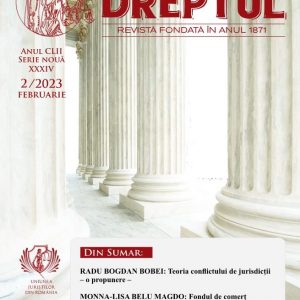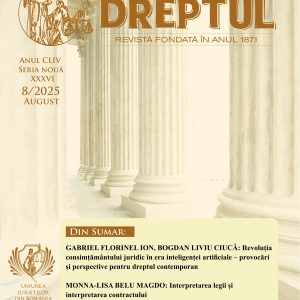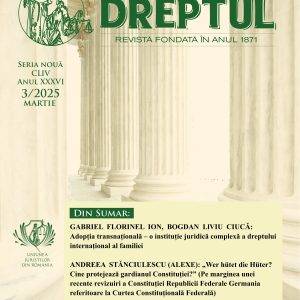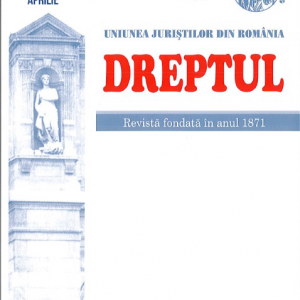-
 Rapid expansion and diversification of international relations boost the improvement of public international law, by adopting new rules or by adapting the existing ones to the new relationships between states and other international entities, in order to protect the global legal order by preventing the acts of aggression or other events that may affect the safety of states, human rights, environment or other universally recognized values.
Rapid expansion and diversification of international relations boost the improvement of public international law, by adopting new rules or by adapting the existing ones to the new relationships between states and other international entities, in order to protect the global legal order by preventing the acts of aggression or other events that may affect the safety of states, human rights, environment or other universally recognized values. -

-

-

-
 The unpredictability involves the intervention of the judge in a contractual legal relationship. Intellectual property can be considered a „laboratory” in which the intervention of the judge in the agreement of the parties has always been allowed. Without any connection with the unpredictability, in patent law there are legal mechanisms that allow the court to intervene to complete the contract regarding the quantum of the price in order to encourage the exploitation of the invention. In this hypothesis, the parties agree to contract, they do so, setting even the object of the contract, less the sale price. In other cases, the parties are obliged to contract by law, the court being required to intervene in the contractual mechanism established by law to determine the price. In Romania it cannot be argued that under the influence of the previous Civil Code the legislator has ruled on the non-application de plano of the unpredictability and that he would have been in favour of its application in certain special laws, such as the one from the field of intellectual property, because the reason for the judge’s intervention in the agreement of the parties is to favour the exploitation of intellectual creations, encouraging creativity. In the new Civil Code the conditions of the unpredictability are: 1. the existence of an excessive onerosity caused by an exceptional change (out of the ordinary, and not an ordinary one, simple or routine) and unforeseen (unpredictable), including as extension, of the circumstances existing at the conclusion of the contract. Excessive onerosity represents a contractual imbalance in relation to the initial contractual balance, which must exist as long as neither of the parties’ benefits can have a significantly higher value than the other, in the light of the regulation of the injury in the new Civil Code.
The unpredictability involves the intervention of the judge in a contractual legal relationship. Intellectual property can be considered a „laboratory” in which the intervention of the judge in the agreement of the parties has always been allowed. Without any connection with the unpredictability, in patent law there are legal mechanisms that allow the court to intervene to complete the contract regarding the quantum of the price in order to encourage the exploitation of the invention. In this hypothesis, the parties agree to contract, they do so, setting even the object of the contract, less the sale price. In other cases, the parties are obliged to contract by law, the court being required to intervene in the contractual mechanism established by law to determine the price. In Romania it cannot be argued that under the influence of the previous Civil Code the legislator has ruled on the non-application de plano of the unpredictability and that he would have been in favour of its application in certain special laws, such as the one from the field of intellectual property, because the reason for the judge’s intervention in the agreement of the parties is to favour the exploitation of intellectual creations, encouraging creativity. In the new Civil Code the conditions of the unpredictability are: 1. the existence of an excessive onerosity caused by an exceptional change (out of the ordinary, and not an ordinary one, simple or routine) and unforeseen (unpredictable), including as extension, of the circumstances existing at the conclusion of the contract. Excessive onerosity represents a contractual imbalance in relation to the initial contractual balance, which must exist as long as neither of the parties’ benefits can have a significantly higher value than the other, in the light of the regulation of the injury in the new Civil Code. -
 In the context of the amendments operated on the Administrative Disputes Law No 554/2004 by the Law No 212/2018, the author proposes to analyse the time limits in which the prior complaint can be filed and to analyze each of them separately, by grouping them according to the subject of the prior complaint and to the object of the prior complaint. The author makes the transition from the time limits imposed on the addressees of the administrative act to the time limits imposed on third parties, in the situation of the typical and assimilated individual administrative act, by investigating the length of the time limit, the moment from which it starts, the legal nature or the applicable legal regime and the sanction applied in case of non-compliance with these time limits. The main time limits within which the prior complaint can be filed are analyzed, special attention being given to cases where the prior complaint is not mandatory. Finally, the author emphasizes the importance of applying these time limits in just measure so that the prior complaint procedure does not become an obstacle, not related to the concrete situation, in the way of access to justice of the alleged injured party, nor it becomes an instrument of abuse.
In the context of the amendments operated on the Administrative Disputes Law No 554/2004 by the Law No 212/2018, the author proposes to analyse the time limits in which the prior complaint can be filed and to analyze each of them separately, by grouping them according to the subject of the prior complaint and to the object of the prior complaint. The author makes the transition from the time limits imposed on the addressees of the administrative act to the time limits imposed on third parties, in the situation of the typical and assimilated individual administrative act, by investigating the length of the time limit, the moment from which it starts, the legal nature or the applicable legal regime and the sanction applied in case of non-compliance with these time limits. The main time limits within which the prior complaint can be filed are analyzed, special attention being given to cases where the prior complaint is not mandatory. Finally, the author emphasizes the importance of applying these time limits in just measure so that the prior complaint procedure does not become an obstacle, not related to the concrete situation, in the way of access to justice of the alleged injured party, nor it becomes an instrument of abuse. -
 By the provisions of the Law No 122/2006 on asylum in Romania, as amended and supplemented, the legislator has chosen to derogate from the provisions of common law in the matter of recourse with regard to the time when it starts to run, having as starting point the moment when the judgment of the first instance court was pronounced, without having in view the presence or absence of the party concerned, as well as without taking into consideration the special situation of the asylum seekers from Romania, foreign citizens or stateless persons, most of them not speaking Romanian. This study intends to emphasize how, by this derogation from the processual civil provisions which represent the common law in the matter, it is violated the free access to justice established by the provisions of Article 21 of the Constitution of Romania, supporting the running of the time limit for recourse from the time of communication of the judgment of the court of first instance, and not from the time of pronouncement.
By the provisions of the Law No 122/2006 on asylum in Romania, as amended and supplemented, the legislator has chosen to derogate from the provisions of common law in the matter of recourse with regard to the time when it starts to run, having as starting point the moment when the judgment of the first instance court was pronounced, without having in view the presence or absence of the party concerned, as well as without taking into consideration the special situation of the asylum seekers from Romania, foreign citizens or stateless persons, most of them not speaking Romanian. This study intends to emphasize how, by this derogation from the processual civil provisions which represent the common law in the matter, it is violated the free access to justice established by the provisions of Article 21 of the Constitution of Romania, supporting the running of the time limit for recourse from the time of communication of the judgment of the court of first instance, and not from the time of pronouncement. -
 This study deals with the problem of the judicial remedy and of the time limit for exercising it in case of the rejection on the merits of the application for establishing guardianship. The analysis is carried out from the perspective of the civil procedural provisions which regulate the procedure for settling the non-contentious applications.
This study deals with the problem of the judicial remedy and of the time limit for exercising it in case of the rejection on the merits of the application for establishing guardianship. The analysis is carried out from the perspective of the civil procedural provisions which regulate the procedure for settling the non-contentious applications. -
 The crime of family abandonment is a continuing offense. The courts have strictly enforced the decision no. 10/2008 issued by the High Court of Cassation and Justice, joint Sections, which sets forth that in the case of continuing and continued offenses, the prior complaint shall be admitted within two months from the date the injured party or the party entitled to file the prior complaint has knowledge of the identity of the offender. The decision issued in second appeal in the interest of law shall be binding and might lead to the suspension of the criminal trial in all cases concerning abandonment of family. Thoroughly analyzing the doctrine and jurisprudence, the author identifies a solution for solving this dilemma.
The crime of family abandonment is a continuing offense. The courts have strictly enforced the decision no. 10/2008 issued by the High Court of Cassation and Justice, joint Sections, which sets forth that in the case of continuing and continued offenses, the prior complaint shall be admitted within two months from the date the injured party or the party entitled to file the prior complaint has knowledge of the identity of the offender. The decision issued in second appeal in the interest of law shall be binding and might lead to the suspension of the criminal trial in all cases concerning abandonment of family. Thoroughly analyzing the doctrine and jurisprudence, the author identifies a solution for solving this dilemma. -
 Privileged wills are sometimes viewed as an anachronism. In civil law systems such as Romania or France, the freedom of disposition is limited by certain institutions (e.g. the hereditary reserve and the forced heirship), while this is not the case in common law jurisdictions. Nevertheless, civil and common law systems inherited the Roman notion that in some extraordinary circumstances the testator should be allowed to bypass the rigid formalities required for the validity of a will. In turn, civil law systems view such privileged wills as a rather simplified version of the notarial form, while English law fully lifts the written requirement for these cases. The purpose of the current article is to prove the enduring relevance of privileged wills in the contemporary world through an analysis of their origins, current regulation and prospects.
Privileged wills are sometimes viewed as an anachronism. In civil law systems such as Romania or France, the freedom of disposition is limited by certain institutions (e.g. the hereditary reserve and the forced heirship), while this is not the case in common law jurisdictions. Nevertheless, civil and common law systems inherited the Roman notion that in some extraordinary circumstances the testator should be allowed to bypass the rigid formalities required for the validity of a will. In turn, civil law systems view such privileged wills as a rather simplified version of the notarial form, while English law fully lifts the written requirement for these cases. The purpose of the current article is to prove the enduring relevance of privileged wills in the contemporary world through an analysis of their origins, current regulation and prospects. -
 Prin Hotărârea Guvernului nr. 196/20161 au fost aprobate tezele preliminare ale proiectului Codului administrativ, a cărui adoptare ar permite folosirea unei terminologii unitare pentru aceleași realități juridice, instituții, principii și concepte, reducându-se astfel riscul interpretării lor diferențiate și contradictorii în practica administrativă, precum și în doctrina de specialitate. Codificarea cadrului legal din domeniul administrației publice prin intermediul unui Cod administrativ și al unui Cod de procedură administrativă urmărește simplificarea legislației în domeniul administrației publice, obiectiv urmărit și în Strategia pentru consolidarea administrației publice în perioada 2014–2020, aprobată prin Hotărârea Guvernului nr. 909/2014.
Prin Hotărârea Guvernului nr. 196/20161 au fost aprobate tezele preliminare ale proiectului Codului administrativ, a cărui adoptare ar permite folosirea unei terminologii unitare pentru aceleași realități juridice, instituții, principii și concepte, reducându-se astfel riscul interpretării lor diferențiate și contradictorii în practica administrativă, precum și în doctrina de specialitate. Codificarea cadrului legal din domeniul administrației publice prin intermediul unui Cod administrativ și al unui Cod de procedură administrativă urmărește simplificarea legislației în domeniul administrației publice, obiectiv urmărit și în Strategia pentru consolidarea administrației publice în perioada 2014–2020, aprobată prin Hotărârea Guvernului nr. 909/2014. -
 The study addresses the issue generated by the express regulation of the principle of loyalty in matters of evidence, especially from the perspective of the incidence of the sanction of exclusion of evidence in the cases where this principle has been violated. The author notes that, in general, legality and loyalty in the administration of evidence means the idea of honesty which the judicial bodies must show when constructing evidence, and the violation of these principles generates the solution of applying the sanction of exclusion of evidence. In addition, the article deals also with an aspect of these problems that has not yet received a unitary solution in the national doctrine and case law, respectively that of the existence of a conditionality between the incidence of the sanction of exclusion of evidence on the fault of judicial bodies in the illegal administration of evidence. With theoretical arguments and with examples from the practical activity of the courts, the author shows that the solutions are, on the one hand, in the sense of excluding evidence, and, on the other hand, in the sense of validating them, the court rulings being determined in these cases precisely by the finding of the good faith of the criminal investigation body.
The study addresses the issue generated by the express regulation of the principle of loyalty in matters of evidence, especially from the perspective of the incidence of the sanction of exclusion of evidence in the cases where this principle has been violated. The author notes that, in general, legality and loyalty in the administration of evidence means the idea of honesty which the judicial bodies must show when constructing evidence, and the violation of these principles generates the solution of applying the sanction of exclusion of evidence. In addition, the article deals also with an aspect of these problems that has not yet received a unitary solution in the national doctrine and case law, respectively that of the existence of a conditionality between the incidence of the sanction of exclusion of evidence on the fault of judicial bodies in the illegal administration of evidence. With theoretical arguments and with examples from the practical activity of the courts, the author shows that the solutions are, on the one hand, in the sense of excluding evidence, and, on the other hand, in the sense of validating them, the court rulings being determined in these cases precisely by the finding of the good faith of the criminal investigation body.
